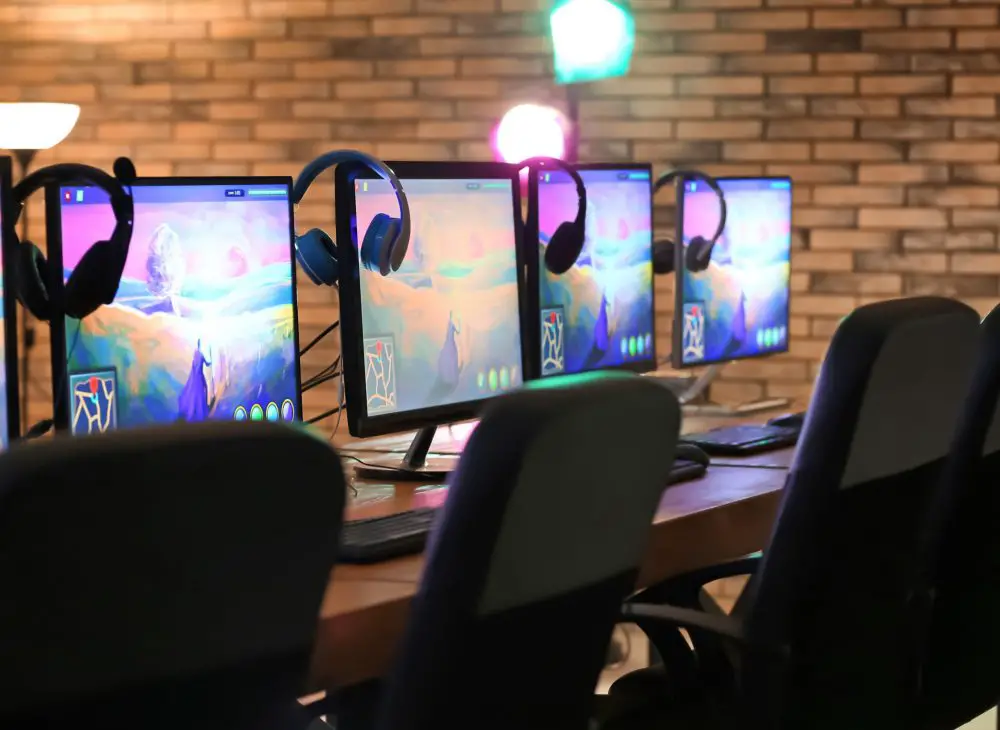
Many gamers ask themselves how long their gaming monitor will last. It is important to know that all monitors will eventually burn out and die, but some do last longer than others. In this blog post, we discuss the different types of monitors and how long they tend to last in order for you to make an educated decision about which one is right for you. We also cover what signs to look out for when determining if your monitor needs replaced as well as whether or not it's ok to leave a computer monitor on all the time!
Do monitors go bad?
Monitors can only go bad if they are used in a way that exceeds the limitations of what it is designed to do. For example, burning our monitor's life span by leaving them on constantly or not taking care of them properly will cause monitors to burn out sooner than expected and die prematurely.
Do monitors get worse over time?
Monitors don't last forever and over time they will gradually start to degrade in quality. They'll usually show some signs of age such as a change in color and brightness or pixelating images on the screen.
How Long Do Gaming Monitors Last?
Monitors that are used for gaming usually last a lot longer than monitors that aren't used for gaming. The reason behind this is because these types of monitors are designed with longevity in mind and as long as you have a proper screen brightness, contrast ratio and refresh rate your monitor should last for at least five years.
The lifespan of most computer monitors is between five to seven years, with LCD models having the shortest life span while CRT models can live up to fifteen years before they need replacing.
But even if you play games daily most brands should be able to run for at least five years or more, this includes 4k gaming monitors.
If you don't look after your monitor you might start noticing changes in quality sooner while extended use will cause them to burn out sooner than expected.
How long does an LCD monitor last?
An LCD monitor can also last for five years or more if you take proper care of it. It's really all about the settings and what type of screen brightness, contrast ratio and refresh rate are being used. If your settings are not optimal then that could shorten the lifespan on an LCD display by as much as half a year to a whole year.
How long do LED monitors last?
LED computer displays will typically have the same longevity as LCD but there is always some chance that they might malfunction prematurely due to improper use such as using them while in an unstable position or from excessive heat sources nearby like lamps or other bright lights.
Make sure you keep these things in mind when trying to extend their life span so they don't burn out sooner
If the budget allows it, investing in quality LED monitor that lasts longer will be worth it since they tend to have a better lifespan than the cheaper LCD monitors that are found in most stores.
How long do crt monitors last?
The lifespan of a CRT monitor depends on the environment in which it's used and how often it's operated. The more you use your computer monitor, the shorter its life will be because it creates heat that can shorten the life span of any electronic device.
A CRT monitor will last for about ten years or more. If you're playing games all day long, your monitor will generally last about five years or more.
CRT monitors generally last longer because they use a lighter electrical current and less electricity to operate, so it takes longer for them to burn out.
However CRT monitors are no longer available in most stores because they're not as popular with consumers who enjoy the faster response time of an LED monitor. CRTs typically have poorer color quality than LCDs or LEDs which can make watching movies or playing games difficult, so this is another reason for their demise.
Can a monitor just die?
Yes, monitors can fail without any warning.
There is no way to prevent it from happening - and if you want to ensure that your monitor lasts as long as possible, we recommend also using a screen saver or turning the computer off when not in use.
What are the signs of a dying monitor?
If you notice any visual inconsistencies when using your computer monitor (e.g., lines or pixels that don't appear correctly), it could be an indicator of a failing screen - but this isn’t always true! It's more likely that your monitor is simply experiencing a visual anomaly, which can be resolved by restarting the device.
A flickering screen or backlight is another sign of a failing computer monitor while costlier models tend to have a more even backlight.
Regardless of the type or size, monitors do not last forever and will eventually stop working.
A dying computer monitor may show an image with one part of the screen darker than another - this could mean there's a problem with your display device!
Which factors affect the life span of a gaming monitor?
Monitors with better refresh rates and response times can also last longer because they require less power to run.
The size of the monitor can also have an effect on its lifespan. The larger monitors are heavier and use more power to run, so they might not last as long as a smaller one that doesn't take up much energy at all.
Monitors can also be damaged by high temperatures and humidity levels, so it's best to keep your monitor in a cool, dry place.
Avoid keeping monitors on for hours and hours each day - they'll start to wear down faster than if you only use them when needed.
Monitors can also be damaged by being dropped on a hard surface or exposed to liquids, so be careful with your equipment.
A monitor's life span can also depend on the quality of the screen itself, and how well it was manufactured. Some monitors may last longer than others due to their material grade or build quality - for example, a good LED vs an average one might last twice as long!
It is recommended to get a monitor that is unplugged after use, to make sure it stays in good shape.
How often should I replace my gaming monitor?
A gaming monitor should be replaced when it can no longer display graphics at an acceptable level. Your eyes will also tell you if it's time to switch, as the colors might start looking washed out or blurry.
The best way to know for sure is by checking the warranty and specifications on your current model - every company has a different warranty depending on their monitor.
If you have an LG or Samsung, for example, the manufacturer will tell you how often and when to replace your monitor based on the frequency of usage. What they recommend might not be what's best for everyone - it really depends on your needs as a gamer! If you're looking at replacing your gaming monitor, you can also talk with a specialist at your local store. They'll normally be happy to tell you what they think is the correct action based on their knowledge of monitors and warranties.
Sometimes you might just want to replace your gaming monitor because you're looking to upgrade or just want different features. It's a personal choice - and one that might not make sense for everyone!
A new monitor does require some setup; you'll need to learn how to calibrate it, change the settings, or turn on the picture-in-picture function if your computer doesn't support multi-display.
If you're replacing an old CRT with a new LCD monitor, you'll also need to set up the resolution and adjust for DPI.
The reliability of an LCD panel monitor largely depends on two factors: how often it’s used and how long the user allows each session to last
Do monitors burn out?
Some people think that if they leave their monitor on all the time, it will burn out. But there’s no evidence to support this - in fact, turning your monitor off and back on again can actually be damaging for both you and your computer!
Computer monitors can be left on all the time, as long as they're not displaying static images for too long.
The longer you leave your computer running with a monitor that's been shut off and turned back on again, the more it can lead to screen flickering or other visual errors. This is because electricity from an outlet tends to fluctuate when turning on and off, which can damage the monitor.
Is it OK to leave the computer monitor on all the time?
It is not recommended as this can cause screen degradation and damage your graphics card faster. It's also a waste of energy that you could use elsewhere in your home, such as heating for winter months.
So you should always turn off your computer monitor when not in use - this will save energy and prolong its life.
If it's just been sitting on standby mode, then it might have already reached optimal performance. A good rule of thumb is that a monitor should not be left on constantly (i.e., 24 hours per day).
If it's been turned off for more than a day, then you should power up the monitor to make sure that it is fully functioning. If your monitor has gone unused for an extended period of time (more than a week), then its brightness and contrast might need altering and calibration again in order to get optimal performance out of the device.
Do LED monitors get burn in?
LCD monitors are not immune from screen burn-in, and while LED screens have a much lower risk of permanent damage there is still the chance that it will happen.
LED displays typically need to be on for around three hours at a time before you start seeing any negative side effects - so if using your computer as an entertainment center or to watch movies, you'll be fine.
An easy way to get around this is by using a screen saver or turning the computer off when not in use.
Do LCD monitors have burn-in?
Yes, LCD monitors can also suffer from burn-in.
Out of all the types of monitors, LCD monitors are at the highest risk for screen burn because they don't use a backlight that can be turned off when not in use like LED displays do.
LCD screens also need to stay on for around three hours before you start seeing any negative side effects - so again, make sure you're using a screen saver or turning off your monitor if a single image is going to show for more than an hour or two.
Conclusion
The lifespan of any type of computer display varies based on how much you use it. But generally there's no reason you shouldn't easily get 5 years and more from your LCD or LED monitor if looked after well.
Both CRT monitors and LCD/LED monitors have their own benefits, whether it be size or longevity. But remember that while one may last longer than the other, they both will eventually die. So choose wisely when deciding to purchase a new monitor.
And if you are a heavy user who watches videos, plays games or does other things that require the monitor to stay on for hours per day, then it's best to go with a good quality LCD/LED panel.
